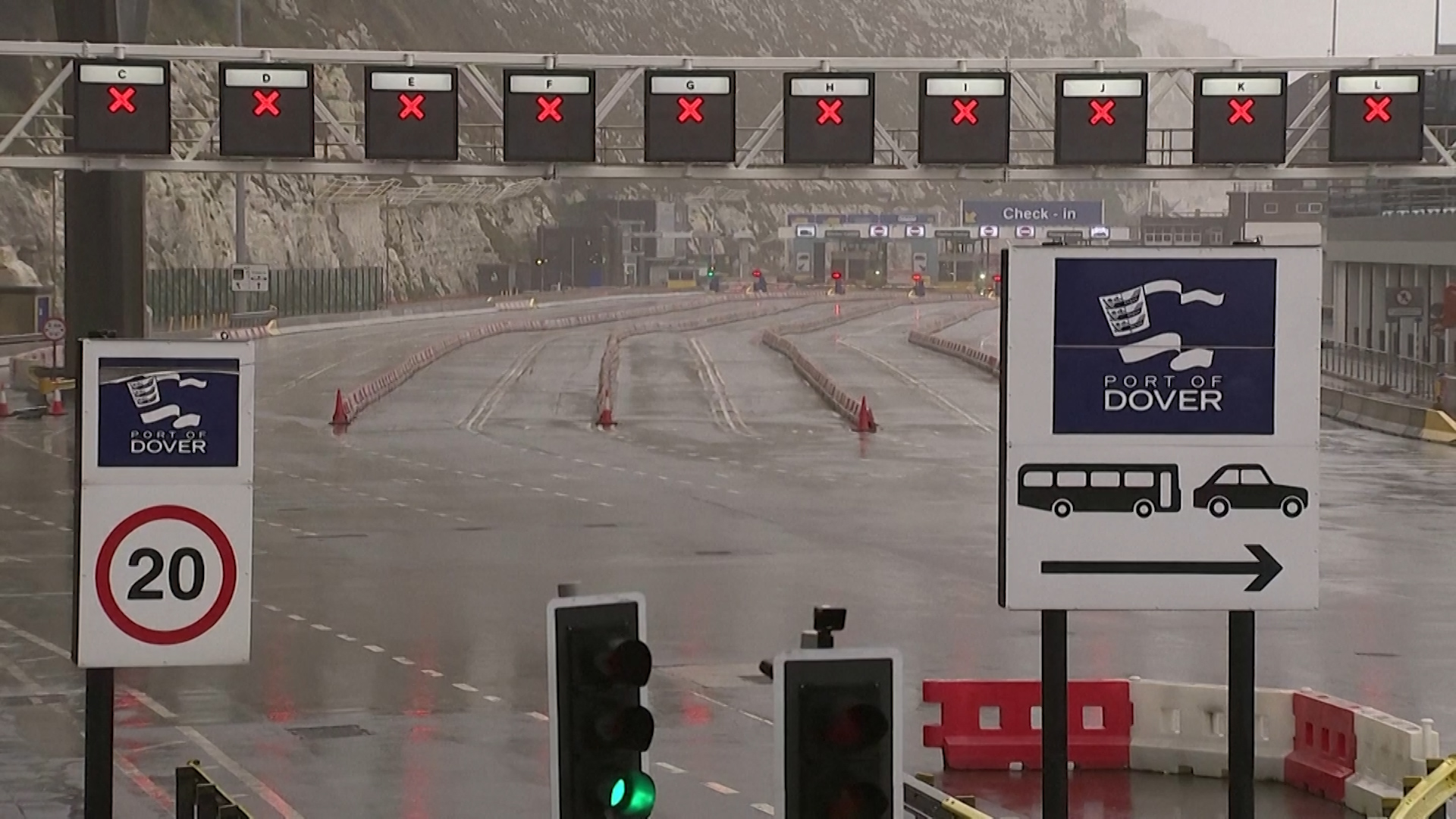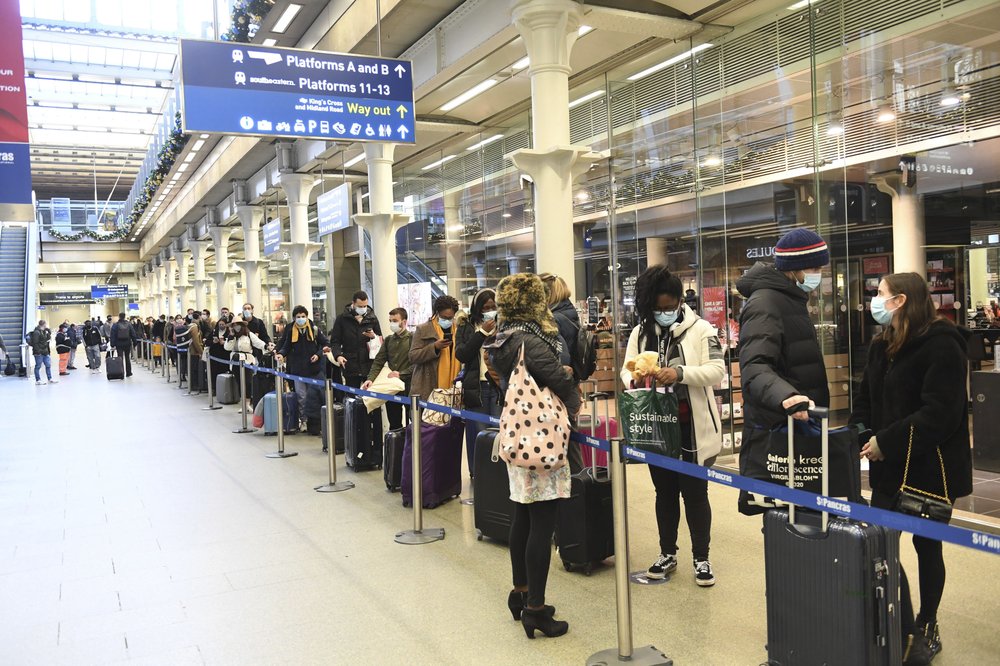02:47

UK Prime Minister Boris Johnson has said he fully understands "the anxieties" of the UK's international partners about the new variant of COVID-19 discovered in the South East region of England, as countries across the world shut their borders to British travelers.
He added that he hoped to resolve border issues with France "within hours" after President Macron closed the borders for 48 hours. In the meantime, the EU member states have called on the European Commission to draw up a coordinated response to isolate the mutant variant in the UK.
Key points:
• UK Prime Minister Boris Johnson said he had spoken to France's President Emmanuel Macron and that they were hopeful to resolve border issues "in the next few hours if we can."
• Germany, Italy, the Netherlands, Belgium, Ireland, Norway and Turkey are among those to stops flights from the UK, while France has temporarily closed its borders with the country.
• UK cases rose by 33,364 on Monday, almost double the figure recorded a week ago, after the health minister described the new COVID-19 variant as "out of control."
• France's travel ban has forced the UK Port of Dover to shut down, leading to long freight queues and possible supply chain disruption.
• EU member states are asking the European Commission to harmonize a bloc-wide response to the spread of the new variant.

A growing number of countries have banned flights and other travel from the UK, with other nations considering limiting links to the UK, after it was announced the new variant was "spreading rapidly."
On Saturday, Johnson announced new restrictions for the UK's capital London and its South East region as cases of the new variant surged in those areas.
Outside Britain, nine cases of the new strain have been reported in Denmark, as well as one case in the Netherlands, Australia, and Italy. Emma Hodcroft, co-founder of nextstrain, which monitors and tracks viruses, tweeted that for the first three, these cases were likely to have been exported from the UK.
The Netherlands government has banned all flights carrying passengers from the UK from Sunday, with travel restrictions to remain in place until at least January 1. It added that it was monitoring developments and could also consider additional measures on other modes of transport.
In early December, the authorities said samples from a case in the Netherlands had revealed the same variant found in the UK.
Canada halted passenger flights from Britain for 72 hours from midnight on Sunday, with those who had already arrived from Britain subject to screenings and other measures.

Meanwhile, Italy, which found the new strain in one person, has blocked flights from the UK and is blocking the entry of people who have been there during the past 14 days. Anyone who has recently traveled from Britain must also be tested.
Belgium followed suit by issuing a flight ban for 24 hours starting at midnight on Monday "out of precaution," according to the country's Prime Minister Alexander De Croo.
"There are many questions about this new mutation," De Croo said, adding that he hopes to have more clarity on the situation by Tuesday.
Spain and Portugal have suspended flights from the UK from Tuesday, with Madrid only allowing its nationals or residents to enter from Britain.
France has suspended all UK travel links for 48 hours, closing off one of the most important trade arteries with mainland Europe.
Johnson spoke to his French counterpart Emmanuel Macron by phone, saying "we both understand each other's positions and want to resolve these problems as fast as as possible."
Germany stopped air links with the UK from midnight on Sunday, with the ban slated to last until December 31. Cargo flights will be exempt, but a government source said Berlin is already "working on measures" to extend the suspension into January.
Ireland also suspended almost all travel for 48 hours on Sunday evening, while Switzerland closed its borders on Monday, imposing a 10-day quarantine on those who arrived since December 14.
All three Baltic states – Estonia, Latvia and Lithuania – have halted all passenger flights from the UK. Lithuania will still allow flights to depart for the UK, while Estonia and Latvia have halted those as well. Latvia has also banned bus and ferry passenger traffic to and from the UK. The bans came into effect on Monday and will last until the end of the year.
Norway has halted all flights to and from the UK with immediate effect for a minimum of 48 hours, the country's health minister Bent Høie said in a statement. Sweden has also followed suite with a 48 hour ban on Monday.
Bulgaria said flights to and from Britain would be suspended from midnight Sunday until January 31. The government had earlier announced a 10-day quarantine for anyone arriving from the UK.
Romania has banned all flights to and from the UK for two weeks, beginning on Monday afternoon, alongside Czechia.
Balkan countries including Croatia, Macedonia and Albania are all suspending flights until January 31.
Turkey's Health Minister Fahrettin Koca said on Twitter that flights from Britain, Denmark – where nine cases of the new strain have been detected – the Netherlands and South Africa would be suspended.
Iran's health ministry has ordered flights from Britain suspended for two weeks, state news agency IRNA reported.
Israel said it was barring entry to foreign citizens traveling from Britain, Denmark and South Africa. A joint statement by Prime Minister Benjamin Netanyahu's office and the health ministry also announced strict rules for Israelis returning home from those nations, saying they would be confined in army-run hotels serving as quarantine centers.
Saudi Arabia said on Sunday it was halting all flights and suspending entry through its land and seaports for at least a week, with the option to extend for a further week. Starting December 8, Passengers who arrived in Saudi Arabia from Europe, or any country where the new strain was detected, will be required to self-isolate for two weeks and undergo testing.
Kuwait has added the UK to a list of "high-risk" nations and banned flights.
El Salvador's President Nayib Bukele said on Twitter that anyone who had been in the UK or South Africa in the past 30 days will not be allowed to enter the country.
Peru has gone further, banning all flights from Europe and the entry of any foreigner who had been in Britain in the past fortnight, while Argentina and Chile have limited their bans to the UK.

People at St. Pancras station in London wait to board the last train to Paris on Sunday, December 20, 2020. /AP
People at St. Pancras station in London wait to board the last train to Paris on Sunday, December 20, 2020. /AP
New strain "out of control"
The UK's Health Secretary Matt Hancock has said the mutant variant "is out of control" and that he is "really worried" about how the country's healthcare service will cope with an influx of infections.
The WHO confirmed it was "in close contact with UK officials" and would update governments and the public as more is learnt. However, emergencies chief Michael Ryan said on Monday the new variant "is not yet out of control." But added: "In some senses, it means we have to work harder. Even if the virus has become a little bit more efficient in spreading, the virus can be stopped."
A WHO official confirmed the variant was first identified in the South East of England in September and has been circulating in the area since.
Studies are under way to better understand how fast it spreads and whether "it's related to the variant itself, or a combination of factors with behavior," Maria Van Kerkhove, the WHO's technical lead on COVID-19, said.
Johnson said on Saturday the new strain "could increase the R [rate of infection] by 0.4 or more and is up to 70 percent more transmissible than the original disease," warning it was "spreading very fast."
However, the UK prime minister stressed there was no evidence to suggest it is more lethal, causes more severe illness, or that vaccines will be less effective against it.

